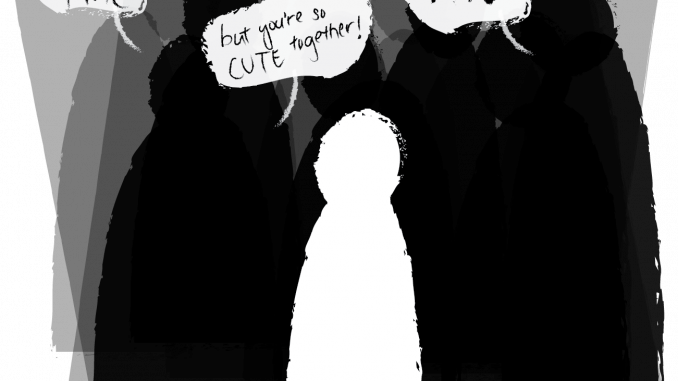
I met my first love in a middle school health class. He sat behind me and one day, he came into class wearing a cast on his arm. I asked if he was OK. We became fast friends. I was 12 years old.
I was 14 years old and just weeks into our four-year relationship when he began to subtly control my behavior.
I’ve been asked by new friends, therapists, dates and even my family why I didn’t leave before things “got bad.” I know when they say “before things got bad,” they really mean “before he started to hit you,” as if the years of emotional abuse don’t matter when compared to the subsequent physical and sexual abuse.
But my abuser snuck up on me. He held my hand through two major surgeries, my mom’s second divorce and the crippling anxiety and depression that stemmed from my mother’s suicidal ideation. He brought me hot chocolate to school in the morning and drove me home every afternoon. We did all the “first love” things you’re supposed to do when you’re 14.
My partner and I were so inseparable that many of our friends no longer knew us apart. I hardly knew us apart. He could manipulate me into anything and it was normalized by everyone around me.
When I cancelled on my friends because he was jealous, no one questioned it. When he yelled at me for crying and made me feel like my emotions were completely illogical and invalid, no one questioned it. When he shoved me against the lockers in the crowded hallways at school, no one questioned it.
“That’s just how they act together,” they’d say.
So at age 17 when I drank more than he wanted me to at parties and he dragged me down the stairs to hit me in the basement, no one questioned it. When he threatened to kill me in my own kitchen while my parents were away, no one questioned it.
When I finally got out of the relationship, just weeks before my 18th birthday, I went to a party. Our friends found me later, completely unconscious with my abuser on top of me. No one questioned it.
“That’s just how they act together,” they’d say.
I don’t forgive my abuser, and I don’t forgive my high school friends, although I usually pretend I do. I think I’d have an easier time facing them if I would have received help sooner, but there was nowhere for me to go. Even as someone who was already in therapy for depression and anxiety, I struggled to find the specialized care I needed.
I spent the second half of my senior year of high school in and out of intensive outpatient and partial hospitalization programs for adolescents. At almost 18, I was one of the oldest patients in the groups of teenagers, who discussed family problems and behavioral issues at school. I was certainly the only patient struggling with PTSD triggered by domestic violence.
When I got to Temple and tried to organize specialized counseling at the Tuttleman Counseling Center, I was shown to a self-help center with workbooks specifically about PTSD for veterans.
And despite countless searches for domestic abuse support groups in the city, I have always been discouraged by their descriptions, which were almost always targeted toward either married women with abusive husbands or teens who experienced sexual assault.
The lack of options for me has often made me feel isolated. But I know I’m not alone. I know there are college girls like me out there.
Although I initially struggled to find resources specifically for partner abuse survivors, I was lucky enough to eventually find a therapist in Center City who specializes in trauma. The other day she told me that if nothing else, she wanted me to leave my session each week believing a little more truly that although my trauma changed me, it did not ruin me. Writing this, remembering how little time has passed since I thought I would die at the hands of my abuser, I think I am beginning to believe her.
October is Domestic Violence Awareness Month, and I feel it’s important that I share my story. In this month, especially, it’s important we all realize that many of us have internalized ideas about what abuse looks like, what victims and abusers look like and what recovery should look like. I know my abuser doesn’t look like an abuser any more than I look like a victim.
I’m not even close to the end of my recovery. I struggle with PTSD every day. I have regular nightmares, flashbacks and violent hallucinations, and I struggle with eating and sleeping. But I’m excelling in college when just three years ago, I thought I would never be stable enough to go away to school. I have friends who validate my experiences instead of making excuses for people who hurt me. I have a boyfriend who warns me before violent scenes in “Game of Thrones” and understands why sometimes I just can’t be touched. I have a mother who is learning not to feel hurt when I don’t feel safe in our home.
I have a long way to go, but I am not ruined. And that is not nothing.
Erin Moran can be reached at erin.moran@temple.edu.


Be the first to comment